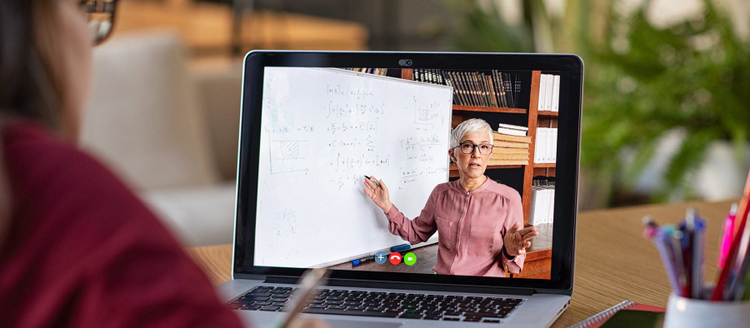Teach the World Foundation Offers a Lesson in Digital Learning

Just three short months ago, COVID-19 and related quarantine mandates not only emptied offices worldwide, but they also transformed homes into classrooms — casting digital learning into the spotlight.
The transition has been anything but easy for schools, educators, and students (not to mention their parents). Most had never experienced a virtual classroom environment, let alone used a videoconferencing tool like Zoom or Adobe Connect. Among the many challenges: mastering the technology, overcoming connectivity issues in remote locations, and simulating the in-class experience, including how to engage students, hold their attention, and keep them interested.
That’s an area where Shafiq Khan is well-versed. In 2016, the longtime senior executive at Marriott International changed course and founded Teach the World Foundation, a Washington, D.C.-based nonprofit that aims to enhance global literacy using digital technology. The organization has been offering free digital-learning resources during the pandemic.
“Our programs were designed for out-of-school children in developing countries, but now that everyone is out of school in this crisis, it has led us to pivot to launch our ‘at home’ program fast,” Khan says. “It has only been available on a limited basis, but we, as well as students, parents, and teachers, are pleased with the results so far.”
Making learning fun
Originally from Pakistan, Khan frequently traveled back from the U.S. during the course of his business career and saw how, without proper education, the poorest in his home country were unable to realize better outcomes. Khan began thinking about how his experience in digital business and technology could help those less fortunate–and Teach the World Foundation was born. Its mission: to help poverty-stricken and often illiterate children without access to schools learn to read, write, do arithmetic, and develop a love of learning.
“Enhancing learning will increase world productivity and thus boost economies everywhere, and greater education will solve many of the ills plaguing the developing world — poverty, crime, hunger, social ills,” Khan says.
The work his organization is doing not only in Pakistan, but also Bangladesh and Malawi, shows that students can learn as well or better than children in a traditional school when given the right digital tools, he says. For Teach the World Foundation, the right digital tools translates to e-learning delivered on user-friendly devices, such as tablets, and in the form of educational games, which the organization curates to find best-in-class offerings.
Among the offerings are Footsteps2Brilliance, which is a comprehensive English and Spanish literacy app that can be used on any mobile device with or without an Internet connection, and TODO MATH, which is an interactive math practice for Pre-K to 2nd grade.
“Before the digital age, the opportunity to gamify education was limited,” Khan notes. “By contrast, now it is almost limitless today. Thus, we will learn from immersive games that keep our attention 100 percent of the time versus 50 percent or less typically.”
A key advantage to gamified learning is that content is served up based on the individual’s learning proficiency and designed with built-in leveling, he points out. In other words, a student cannot get to level two until he or she completes level one. The games also provide incentives for students (points, prizes, etc.) to continue playing until they master the content.
Khan also sees the power of virtual reality and augmented reality to provide immersive experiences for students as they learn subjects. Imagine the extent to which lessons will stick if a student studying history can, for example, visit a historical site and go for a virtual walk, he says.
“It is worth noting that digital learning is just getting started, and the results are the digital-learning equivalent of the Kitty Hawk airplane, which flew for 12 seconds and 120 feet,” Khan says. “We know that the best is yet to come.”
Next steps
Beyond his own organization, Khan says he hopes to see more players getting involved given the scale of the issues.
“Business, government, and philanthropy should all sponsor, support, [and invest in] the transition to digital learning,” he notes. “That must be the case both in their own home markets as well as in the developing world.”
A more-educated world is good for global business, too, Khan adds.
“The global educational funding establishment — governments, major foundations, foreign aid agencies, the World Bank— already spends [trillions] on education, according to UNESCO,” Khan says. “It must shift much of this spend to digital rapidly. Enough evidence of the comparative advantage of digital over analog learning exists to justify this transition of spending.”
At Adobe, we believe that everyone deserves respect and equal treatment, and we also stand with the Black community against hate, intolerance and racism. We will continue to support, elevate, and amplify diverse voices through our community of employees, creatives, customers and partners. We believe Adobe has a responsibility to drive change and ensure that every individual feels a sense of belonging and inclusion. We must stand up and speak out against racial inequality and injustice. Read more about the actions we’re taking to make lasting change inside and outside of our company.
We also know many people are still impacted by the current COVID-19 crisis and our thoughts are with you. The entire Adobe team wants to thank you, our customers, and all creators around the world for the work you do to keep us inspired during this difficult time.
